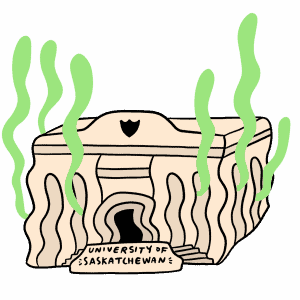On Oct. 15, the University of Saskatchewan announced, via PAWS, their updates to the university’s Smoking, Alcohol and Substances Policy in anticipation of cannabis legalization on Oct. 17. The purported purpose of the updated policy is to promote well-being and cannabis education, while complying with provincial and federal law.
The announcement outlined the major points of the updated policy, stating that cannabis consumption is not permitted on campus property except for medical purposes, that growing cannabis plants is not allowed on campus property except for approved research projects and that staff and students are not to be high while attending class or working. Additionally, the announcement reminded students, faculty and staff that there are supports and accommodations for those with substance-use disorders.
Patti McDougall, vice-provost of teaching, learning and student experience, spoke to the Sheaf about the updates to the policy. She believes that the ultimate goal of the policy is to inform campus-goers of cannabis regulations.
“I think people should educate themselves on what the provincial legislation looks like. People should be aware that it’s driven with a goal to create an environment that promotes and supports health and safety and the well-being of everyone. The policy applies to everyone,” McDougall said. “Education, I think, is the key takeaway — we have to invest in that, and it has to be transparent and accessible to everyone on campus.”
According to McDougall, the changes made to the Smoking, Alcohol and Substances Policy were informed through consultations with a number of different sources, from student leaders to university lawyers to research projects headed by the Ministry of Health.
McDougall reveals that the university submitted an application to the Minister of Justice to have access to the Cannabis Control Act, which would give Protective Services the ability to issue fines for non-compliance with the university’s cannabis policy. However, McDougall was unable to comment on whether or not violations of the policy would be recorded on a student’s academic record, as McDougall says this would be handled on a case-by-case basis.
McDougall states that these procedures are similar to how the U of S manages alcohol use.
“It’s our intention on campus to treat cannabis in the same way that we have focused [on] and been concerned about alcohol,” McDougall said. “We are expecting everyone on campus to respect the policy with the goal of minimizing risks for others. It’s certainly possible that non-compliance will result in such things as fines.”
Although cannabis consumption is prohibited on all campus property, the Smoking, Alcohol and Substances Policy states that the U of S works to “engender a culture — not of prohibition and abstinence — but rather of moderation and informed use.” For McDougall, this disparity is due to provincial legislation, but she says it can be mitigated through dialogue with campus members.
“[Cannabis] is not allowed on campus because the province has prohibited public consumption, so I think our best bet at achieving that goal would be [through] education and awareness,” McDougall said. “The Peer Health mentor group is dedicated to harm reduction in alcohol consumption, and they are quite successful in getting the message out, so I can imagine us replicating this approach in regards to other substances.”
According to McDougall, the policy will be revisited as further laws and procedures around cannabis use are developed.
“The university … will have to be watching and tracking developments and research to be ready to go back and revise our policy, if necessary,” McDougall said. “It looks like, in 2019, legislation might come out around edibles, so we’ll be paying attention. This policy won’t be something that will sit on a shelf unattended — we’ll be careful about tracking and learning about what goes on around us to revise as we need to.”
—
Tanner Bayne / News Editor, Ana Cristina Camacho / Staff Writer
Graphic: Jaymie Stachyruk / Graphics Editor
Leave a Reply